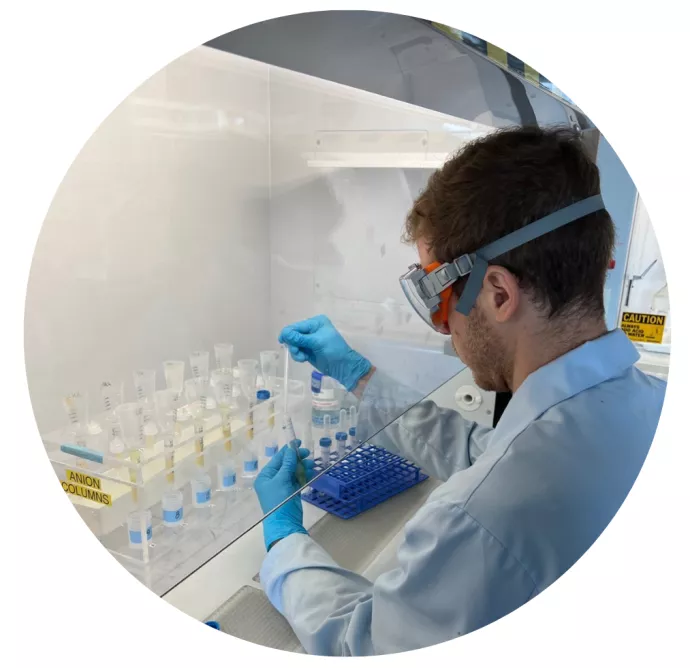
Josh Wolpert's Productive Research Visit to the Community Cosmogenic Facility (CCF) at the University of Vermont
Josh Wolpert joined Prof. Lindsay Schoenbohm’s tectonic geomorphology lab at the University of Toronto Mississauga as a PhD student in 2020 after completing a Master’s degree at Louisiana State University. Josh developed an interest in earth science during his undergrad experience at Hamilton College in Upstate New York, and he became particularly intrigued by geological and climatic processes that help shape earth’s surface. Tectonic geomorphology is a diverse field that attempts to understand the relative impact of these processes by comparing geological, chemical, and climatic data to predictions from conceptual, analogue, and numerical models. After coming across some of Dr. Schoenbohm’s influential research during his Master’s degree, Josh reached out about pursuing a PhD. The prospect of conducting work in the Himalaya with Dr. Schoenbohm at a world-renowned research university was exactly the type of experience Josh was looking for.
As part of his PhD work in studying landscape evolution of Western Nepal, Josh trekked for a month in the Himalaya (despite the pandemic!) and collected sand and bedrock samples that will allow him to better understand how rivers, glaciers, and tectonic forces have contributed to creating the landscape’s present-day appearance. Ultimately, Josh is concerned with concentrations of rare Beryllium (Be) and Aluminum (Al) isotopes in the rock and sand. Much like sunburns, these isotopes form at Earth’s surface and accumulate over time. If covered (e.g., by glaciers or accumulated sediment), their concentrations decline according to each nuclide’s decay rate. Researchers exploit these properties to understand earth surface processes over 104-106 year timescales. Josh and Dr. Schoenbohm chose to work with the Community Cosmogenic Facility (CCF) at the University of Vermont due to the CCF’s world class expertise in extracting in-situ Be and Al.
Through the funding received from the CPS Research Visit Fellowship program that is supported by the Vice Dean, Graduate’s office as well as by the Dept. of CPS, Josh visited the CCF this spring to separate quartz from his rock and sand samples and extract Be and Al. You may wonder, what is involved in these steps? Crushing and sieving so that the samples are between 250-850 microns (1 micron = 0.001mm), passing the samples through magnetic filters, dissolving the samples in a series of hydrochloric, nitric and hydrofluoric acid baths, and isolating Be and Al with anion and cation columns. Once these steps are completed, the samples are ready to be shipped to the Purdue Rare Isotope Measurement (PRIME) Laboratory at Purdue University for accelerator mass spectrometer analyses of 10Be and 26Al.
Although Josh had previously worked with 10Be data to calculate erosion rates, this was the first time he had completed the material separation and chemistry work required to prepare samples for an accelerator mass spectrometer. Going through the full process of planning fieldwork, collecting samples, and processing the samples has given him a greater appreciation for potential complications and preventative measures that can make the process as smooth as possible. Overall, he is extremely grateful for the opportunity to acquire new skills and excited to carry them into future career and research plans.
As the only current graduate student from the Schoenbohm Lab to have completed all of the cosmogenic isotope field and lab work steps, Josh plans to share his experiences with his lab mates and collaborate on project development and data exploration. Not only will this research visit result in contributing significantly to his dissertation, but it will also allow Josh to share his research through presentations at international conferences and journal publications.
